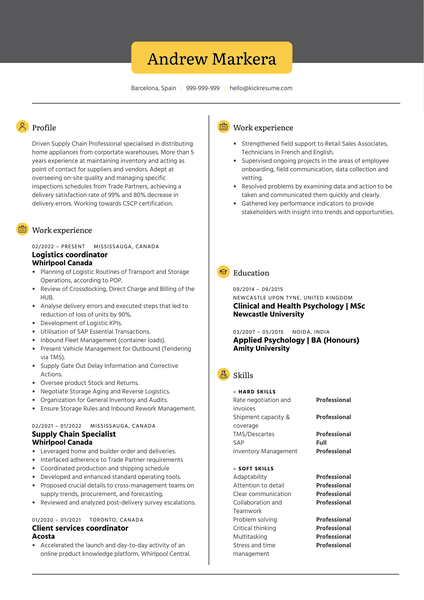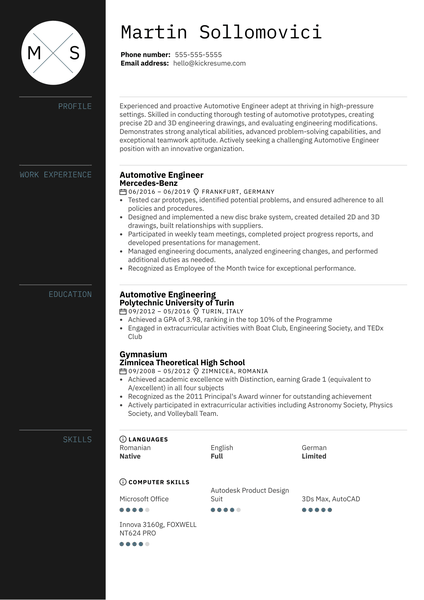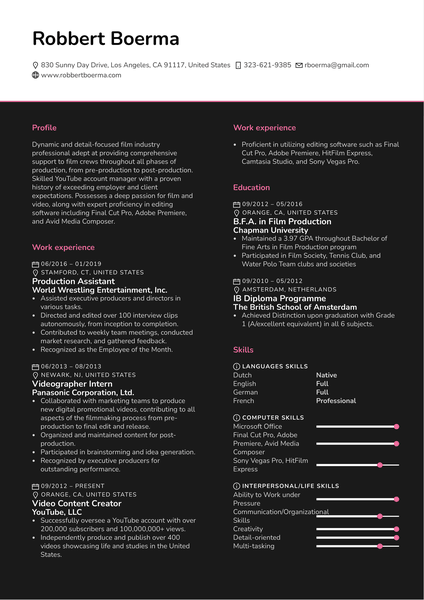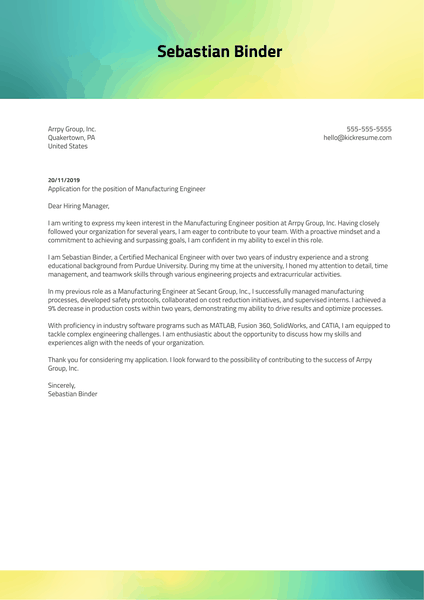How to write an effective automotive production worker resume?
As an automotive production worker, you ensure everyone gets from Point A to Point Z. Every time you see a car or truck pass you, you can feel proud that you contributed to the creation process and made people’s lives easier. However, before you can start making the world go round, you need to craft the perfect resume.
Automotive production workers need to showcase their precision while working in a high-volume environment that will see them contribute to the creation and manufacturing of thousands of cars a year. A strong automotive production worker resume will focus on your skillset, experience, and education to show why exactly you’re the right fit for the company you’re applying for.
Read on to learn how to craft the perfect automotive production worker resume and see job offers start rolling in.
1. Catch the eye in under six seconds
Just like how you’ll be working through thousands of parts a day to produce an automobile, potential hiring managers need to quickly and efficiently weed through resumes to find their ideal candidate.
While we’d like to think that each resume is carefully read through, hiring managers tend to look at a resume for a few seconds before making a split-second decision on whether or not a candidate is ideal for a position, usually by focusing on the resume summary.
Because of this, you’ll need a well-crafted summary (also called an objective or profile) to make the hiring manager decide that you’re right for the position.
When working as an automotive production worker, you’ll need to be quick and efficient with your work, and your summary should be easily and quickly read by a hiring manager.
If you are experienced in the field, leading with this experience is an excellent way to automatically move your resume to the top. Entry-level? That’s fine too. Simply lead with your relevant skills, including experience with machinery, work ethic and ability to work quickly as you have in past jobs. This will allow you to stand out from other candidates by showing why you’re perfect for the job. Still struggling about what to include? Look for action verbs in the job posting and show why your past experiences and skill set make you the right candidate.
2. Position your production worker experience front and center
The biggest mistake people make when talking about their work experience is listing everything they’ve ever done with an assortment of job responsibilities underneath each position they’ve held.
While it’s admirable that you spent a year working as a volunteer park ranger in the middle of the Mojave, if you’ve held three other positions in the production worker field or spent a good amount of time with machinery, you’ll need to focus on the latter jobs to showcase why you’re the right fit for the job you’re applying for.
Next, trash those job responsibilities. No one is going to care about what you were supposed to do. Instead, hiring managers want to know what you actually did at your last job and how it helped your company. If you created over 50 products, ensured workers followed safety procedures resulting in a steep decrease in safety incidents and worked to make teams communicate with one another to increase productivity, hiring managers will want to know.
Focus on why you’re a valuable asset, and how you can help your potential employer improve their company.
For those with less work experience, look to your life experiences. Do you regularly problem solve? Mediate conversations? Solve complex challenges? Pull these incidents together into your work experience section to show why you’re the right person to get hired as an automotive production worker.
3. Use your education to your advantage
While most hiring managers will argue experience is more important than education when looking to hire a production worker, most will want to see your educational background as proof of your work ethic and any relevant skills. If your degree is in a different field, look to include classes or clubs that contribute to what the job posting is looking for.
For example, most production workers need to have excellent time management skills and work calmly in a high-pressure environment. If you regularly organized events for your school and took engineering courses, you can easily relate this experience back to what most hiring managers are looking for in production workers.
4. Focus heavily on relevant skills
Automotive production workers need to have a variety of soft skills, including clear communication, and hard skills, like manual dexterity, in order to succeed in the field. However, no resume is one size fits all, and you’ll want to look at the skills required according to the job listing.
For example, if you notice a heavy insistence on safety in a job listing, you’ll want to talk about your knowledge of current safety and compliance standards. Other skills, like communication, manual dexterity and equipment expertise, are more universal for the field and can be included in resumes for most companies you work for.
Production workers are some of the most important individuals in the creation of new products, requiring an assortment of skills and knowledge to properly complete the job. They must know how to operate machinery as well as work well with their hands to create products efficiently and quickly while adhering to safety standards.
In conclusion...
To get hired as an automotive production worker, you need a resume that showcases why you’re the ideal candidate. By including a strong summary, detailed work history, educational background and detailed skills section, you’ll show hiring managers exactly what makes you the right candidate.
Now that you know how to write a resume that hiring managers actually want to read, you can tailor your document to each job listing you’re applying for. After creating the perfect resume for the automotive production worker jobs you want, you’ll find the job offers come rolling in.







![How to Write a Professional Resume Summary? [+Examples]](https://d2xe0iugdha6pz.cloudfront.net/article-small-images/i-Profile.svg)
![How to Put Your Education on a Resume? [+Examples]](https://d2xe0iugdha6pz.cloudfront.net/article-small-images/i-Collage-Universities.svg)
![How to Describe Your Work Experience on a Resume? [+Examples]](https://d2xe0iugdha6pz.cloudfront.net/article-small-images/Experience.svg)


